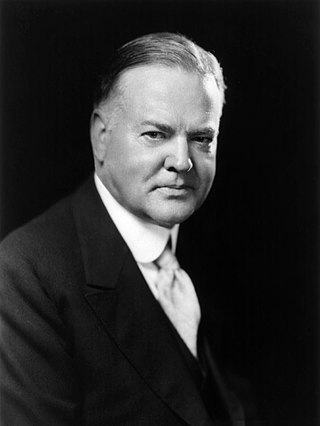
Herbert Clark Hoover was an American politician who served as the 31st president of the United States from 1929 to 1933. A member of the Republican Party, he held office during the onset of the Great Depression. A wealthy mining engineer before his presidency, Hoover led the wartime Commission for Relief in Belgium, served as the director of the U.S. Food Administration, and served as the U.S. secretary of commerce.

The Marshall Plan was an American initiative enacted in 1948 to provide foreign aid to Western Europe. The United States transferred $13.3 billion in economic recovery programs to Western European economies after the end of World War II. Replacing an earlier proposal for a Morgenthau Plan, it operated for four years beginning on April 3, 1948, though in 1951, the Marshall Plan was largely replaced by the Mutual Security Act. The goals of the United States were to rebuild war-torn regions, remove trade barriers, modernize industry, improve European prosperity and prevent the spread of communism. The Marshall Plan proposed the reduction of interstate barriers and the economic integration of the European Continent while also encouraging an increase in productivity as well as the adoption of modern business procedures.
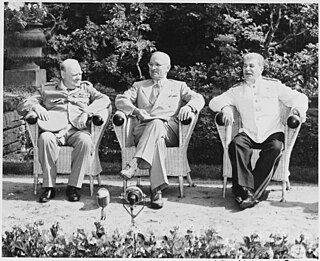
The Potsdam Conference was held at Potsdam in the Soviet occupation zone from July 17 to August 2, 1945, to allow the three leading Allies to plan the postwar peace, while avoiding the mistakes of the Paris Peace Conference of 1919. The participants were the Soviet Union, the United Kingdom, and the United States. They were represented respectively by General Secretary Joseph Stalin, Prime Ministers Winston Churchill and Clement Attlee, and President Harry S. Truman. They gathered to decide how to administer Germany, which had agreed to an unconditional surrender nine weeks earlier. The goals of the conference also included establishing the postwar order, solving issues on the peace treaty, and countering the effects of the war.

The Potsdam Agreement was the agreement among three of the Allies of World War II: the United Kingdom, the United States, and the Soviet Union after the war ended in Europe on 1 August 1945 and it was published the next day. A product of the Potsdam Conference, it concerned the military occupation and reconstruction of Germany, its border, and the entire European Theatre of War territory. It also addressed Germany's demilitarisation, reparations, the prosecution of war criminals and the mass expulsion of ethnic Germans from various parts of Europe. France was not invited to the conference but formally remained one of the powers occupying Germany.

The history of Germany from 1945 to 1990 spans the period following World War II, from the Berlin Declaration marking the abolition of the German Reich and Allied-occupied period in Germany on 5 June 1945 to German reunification on 3 October 1990.
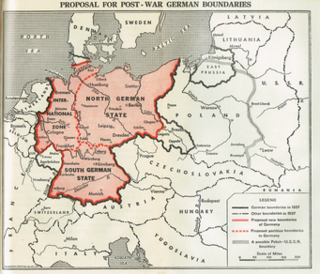
The Morgenthau Plan was a proposal to weaken Germany following World War II by eliminating its arms industry and removing or destroying other key industries basic to military strength. This included the removal or destruction of all industrial plants and equipment in the Ruhr. It was first proposed by United States Secretary of the Treasury Henry Morgenthau Jr. in a 1944 memorandum entitled Suggested Post-Surrender Program for Germany.

Henry Morgenthau Jr. was the United States Secretary of the Treasury during most of the administration of Franklin D. Roosevelt. He played a major role in designing and financing the New Deal. After 1937, while still in charge of the Treasury, he played the central role in financing United States participation in World War II. He also played an increasingly major role in shaping foreign policy, especially with respect to Lend-Lease, support for China, helping Jewish refugees, and proposing measures to deindustrialise Germany.

The Wirtschaftswunder, also known as the Miracle on the Rhine, was the rapid reconstruction and development of the economies of West Germany and Austria after World War II. The expression referring to this phenomenon was first used by The Times in 1950.
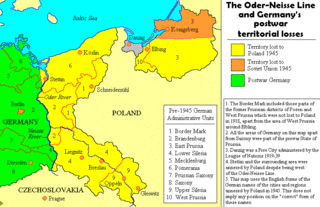
The reconstruction of Germany was a long process of rebuilding Germany after the destruction endured during World War II. Germany suffered heavy losses during the war, both in lives and industrial power. 6.9 to 7.5 million Germans died, roughly 8.26% to 8.86% of the population. The country's cities were severely damaged from heavy bombing in the closing chapters of the war and agricultural production was only 35% of what it was before the war.
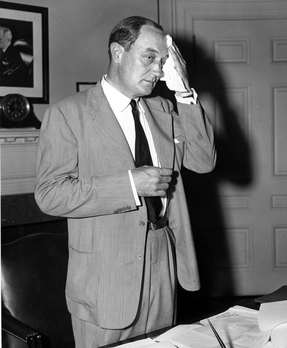
Edwin Wendell Pauley Sr. was an American businessman and political leader.
The Hoover Commission, officially named the Commission on Organization of the Executive Branch of the Government, was a body appointed by President Harry S. Truman in 1947 to recommend administrative changes in the Federal Government of the United States. It took its nickname from former President Herbert Hoover, who was appointed by Truman to chair it.
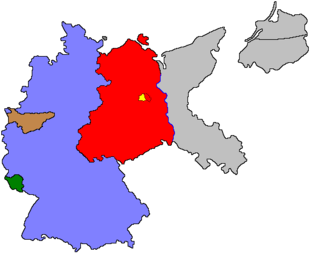
The industrial plans for Germany were designs the Allies of World War II considered imposing on Germany in the Aftermath of World War II to reduce and manage Germany's industrial capacity.

Calvin Bryce Hoover was a noted economist and professor. He spent 1929–1930 in Moscow and wrote The Economic Life of Soviet Russia in 1931. Following his travels to Soviet Russia he also traveled to and researched the economies of Germany, Italy, France, Poland, Czechoslovakia, Denmark, Sweden, Norway, and Australia. He is considered the founder of the field of comparative economic systems.
Herbert Feis was an American historian, author, and economist who was the Advisor on International Economic Affairs in the US Department of State during the Herbert Hoover and Franklin Roosevelt administrations.

American food policy in occupied Germany refers to the food supply policies enacted by the U.S., and to some extent its dependent Allies, in the western occupation zones of Germany in the first two years of the ten-year postwar occupation of Western Germany following World War II.
The presidency of Harry S. Truman began on April 12, 1945, when Harry S. Truman became the 33rd president upon the death of Franklin D. Roosevelt, and ended on January 20, 1953.
The Committee for the Marshall Plan, also known as Citizens' Committee for the Marshall Plan to Aid European Recovery, was a short-term organization established to promote passage of the European Recovery Program known as the Marshall Plan – which "fronted for a State Department legally barred from engaging in propaganda."

The main issues of the United States foreign policy during the 1945–1953 presidency of Harry S. Truman include:

Foreign policy of Herbert Hoover covers the international activities and policies of Herbert Hoover for his entire career, with emphasis to his roles from 1914 to 1933.

The Cold War from 1947 to 1948 is the period within the Cold War from the Truman Doctrine in 1947 to the incapacitation of the Allied Control Council in 1948. The Cold War emerged in Europe a few years after the successful US–USSR–UK coalition won World War II in Europe, and extended to 1989–1991. It took place worldwide, but it had a partially different timing outside Europe. Some conflicts between the West and the USSR appeared earlier. In 1945–1946 the US and UK strongly protested Soviet political takeover efforts in Eastern Europe and Iran, while the hunt for Soviet spies made the tensions more visible. However, historians emphasize the decisive break between the US–UK and the USSR came in 1947–1948 over such issues as the Truman Doctrine, the Marshall Plan and the breakdown of cooperation in governing occupied Germany by the Allied Control Council. In 1947, Bernard Baruch, the multimillionaire financier and adviser to presidents from Woodrow Wilson to Harry S. Truman, coined the term "Cold War" to describe the increasingly chilly relations between three World War II Allies: the United States and British Empire together with the Soviet Union.

















